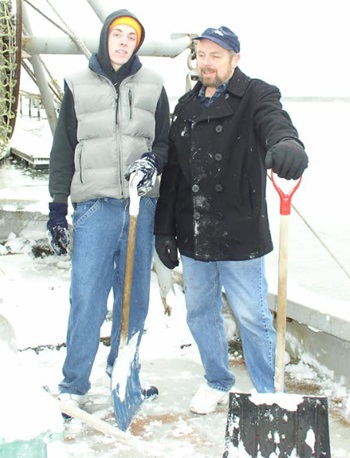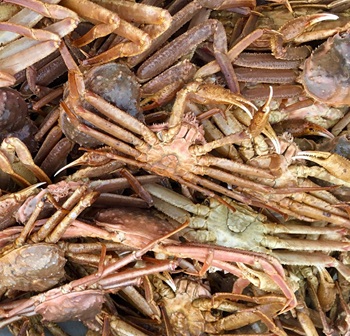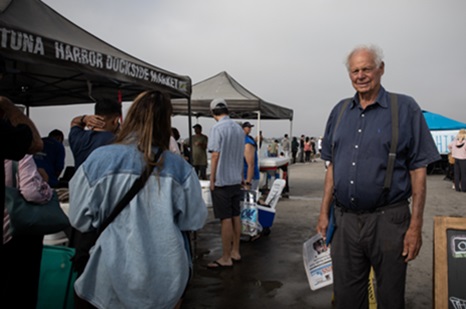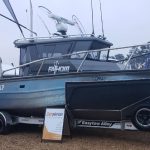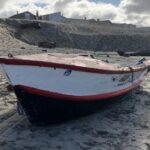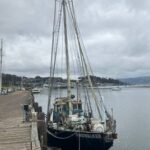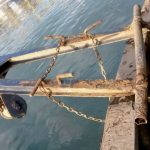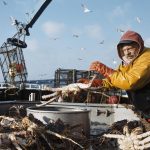Monthly Archives: December 2024
Governor Newsom requests federal fishery disaster relief to support albacore fishing industry
 Today, Governor Gavin Newsom announced a request for a federal fishery disaster declaration to support the albacore fishing industry. Last year marked the worst season for the West Coast North Pacific pole and troll albacore fishery in over 30 years. The California albacore fishery declined 71% in volume and 65% in value. Recognizing the importance of albacore to California’s commercial fisheries, Governor Newsom joined the governors of Washington and Oregon and submitted the request to U.S. Secretary of Commerce Gina Raimondo. If approved, the federal fishery disaster declaration would begin the process of providing needed relief to fishing communities financially impacted by the decline in albacore fishing. links, more, >>CLICK TO READ<< 18:36
Today, Governor Gavin Newsom announced a request for a federal fishery disaster declaration to support the albacore fishing industry. Last year marked the worst season for the West Coast North Pacific pole and troll albacore fishery in over 30 years. The California albacore fishery declined 71% in volume and 65% in value. Recognizing the importance of albacore to California’s commercial fisheries, Governor Newsom joined the governors of Washington and Oregon and submitted the request to U.S. Secretary of Commerce Gina Raimondo. If approved, the federal fishery disaster declaration would begin the process of providing needed relief to fishing communities financially impacted by the decline in albacore fishing. links, more, >>CLICK TO READ<< 18:36
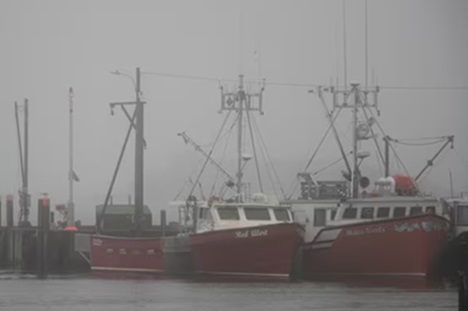
Disabled lobster licence holder wins again against DFO in court
The Federal Court has once again faulted the Department of Fisheries and Oceans for how it has handled the cases of disabled lobster licence holders who sought lengthy exemptions from federal rules that require them to be on board the boat when it is fishing. In a pair of decisions this week, Justice Richard Southcott ruled the deputy minister didn’t properly take into account whether two Nova Scotia fishermen would be discriminated against when the department indicated it would stop allowing substitutes to fill in for them. Federal provisions allow a licence holder with a medical condition to be replaced by a substitute on board, but only for five years. Once that time was up, Robinson was told he could no longer use a stand-in. more, >>CLICK TO READ<< 16:38
VIEWPOINT: Offshore Wind Turbines – Trouble on the Horizon?
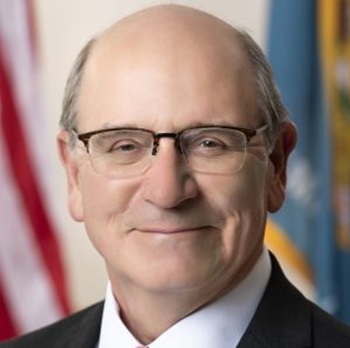 The state’s actions to facilitate a project that will provide no electricity to Delaware and makes one wonder how disruption to our fragile offshore and onshore ecosystem will benefit the citizens of Delaware. As in the contract, US Wind will “monitor” the damage to the fragile ecosystem of the Inland Bays. This in itself is an admission to damage such as changes to nutrient levels, pollutants from construction degrading water quality, damage to fish, shellfish, bay grasses, and other marine life that most believe will not help heal the fragile ecosystem of the Inland Bays but further add to the detrimental changes for minimal actual benefit to Delawareans. Additionally, wind turbines broadcast underwater low-frequency vibrations and create large electromagnetic fields around the miles-long high-voltage transmission lines. more, >>CLICK TO READ<< Representative Jeff Hilovsky 10:41
The state’s actions to facilitate a project that will provide no electricity to Delaware and makes one wonder how disruption to our fragile offshore and onshore ecosystem will benefit the citizens of Delaware. As in the contract, US Wind will “monitor” the damage to the fragile ecosystem of the Inland Bays. This in itself is an admission to damage such as changes to nutrient levels, pollutants from construction degrading water quality, damage to fish, shellfish, bay grasses, and other marine life that most believe will not help heal the fragile ecosystem of the Inland Bays but further add to the detrimental changes for minimal actual benefit to Delawareans. Additionally, wind turbines broadcast underwater low-frequency vibrations and create large electromagnetic fields around the miles-long high-voltage transmission lines. more, >>CLICK TO READ<< Representative Jeff Hilovsky 10:41
John DeMont: The magic of Christmas is the people who make it happen
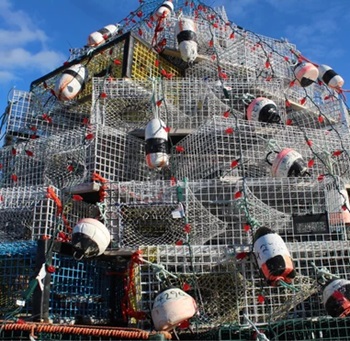 I agree wholeheartedly with the notion that there is something magical about Christmas. The magic, in part, is that it somehow happens every year in our house with no discernible help from me. I say this with shame, not pride. Yet, in some ways, it is for the best. The gift giving — which requires a razor’s edge balance of taste, pragmatism and good will — falls, for good reason, as lightly as a snowflake upon my shoulders. At this point, a thought often occurs to me similar to the one passing through my mind when I head downstairs on Christmas morning: that for this magic to occur, extraordinary people must do remarkable things. In the case of the fisher folk, they must rise in the dark and don layers of clothes. They must drive to a wharf, then they must steam kilometres out on the wild Atlantic Ocean, where they then will hoist up traps from the depths. more, >>CLICK TO READ<< 08:22
I agree wholeheartedly with the notion that there is something magical about Christmas. The magic, in part, is that it somehow happens every year in our house with no discernible help from me. I say this with shame, not pride. Yet, in some ways, it is for the best. The gift giving — which requires a razor’s edge balance of taste, pragmatism and good will — falls, for good reason, as lightly as a snowflake upon my shoulders. At this point, a thought often occurs to me similar to the one passing through my mind when I head downstairs on Christmas morning: that for this magic to occur, extraordinary people must do remarkable things. In the case of the fisher folk, they must rise in the dark and don layers of clothes. They must drive to a wharf, then they must steam kilometres out on the wild Atlantic Ocean, where they then will hoist up traps from the depths. more, >>CLICK TO READ<< 08:22
Baton Rouge restaurants found serving mislabeled imported shrimp — and charging more
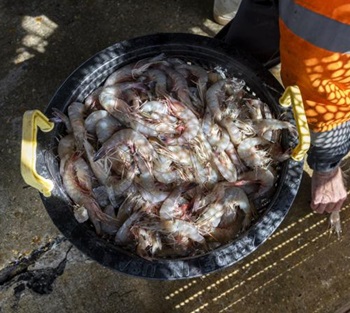 Following a pattern of mislabeling seafood, new genetic testing found that nearly a third of randomly selected Baton Rouge restaurants were advertising imported shrimp as Gulf of Mexico catch. For years, shrimpers and advocates have been raising alarm over cheap imports straining the declining industry. Around 90 percent of shrimp sold in the United States is farm-raised and imported, according to the Louisiana Shrimp Association. SeaD Consulting, a company that has been using rapid genetic testing across the region, sampled menu items from 24 restaurants around Baton Rouge and found that seven were promoting imported shrimp as local. “This genetic testing is a good sign to back up what we’ve been saying all this time,” Acy Cooper, the president of the Louisiana Shrimp Association, said. “They’re selling this stuff off the backs of Louisiana fishermen.” more, >>CLICK TO READ<< 06:44
Following a pattern of mislabeling seafood, new genetic testing found that nearly a third of randomly selected Baton Rouge restaurants were advertising imported shrimp as Gulf of Mexico catch. For years, shrimpers and advocates have been raising alarm over cheap imports straining the declining industry. Around 90 percent of shrimp sold in the United States is farm-raised and imported, according to the Louisiana Shrimp Association. SeaD Consulting, a company that has been using rapid genetic testing across the region, sampled menu items from 24 restaurants around Baton Rouge and found that seven were promoting imported shrimp as local. “This genetic testing is a good sign to back up what we’ve been saying all this time,” Acy Cooper, the president of the Louisiana Shrimp Association, said. “They’re selling this stuff off the backs of Louisiana fishermen.” more, >>CLICK TO READ<< 06:44
Elver prosecutions trickle into court after ‘hell’ year on N.S. and N.B. rivers
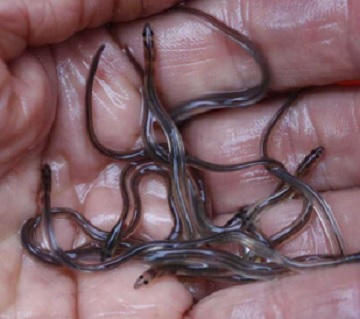 About three dozen people have been charged with offences related to this year’s chaotic illegal fishery for juvenile eels in the Maritimes, a number that falls well short of the overall tally of arrests this spring but which the federal Department of Fisheries and Oceans says could grow. The enforcement of the lucrative fishery for the tiny eels, also known as elvers, has been heavily scrutinized in recent years, with many in the industry outspoken about what they view as a failure to crack down on rampant poaching. The department said Friday that 37 people have been charged with elver-related fisheries offences committed in 2024, providing for the first time a concrete number of prosecutions that have emerged from a year when fisheries officers struggled badly to keep pace. more. >>CLICK TO READ<< 19: 03
About three dozen people have been charged with offences related to this year’s chaotic illegal fishery for juvenile eels in the Maritimes, a number that falls well short of the overall tally of arrests this spring but which the federal Department of Fisheries and Oceans says could grow. The enforcement of the lucrative fishery for the tiny eels, also known as elvers, has been heavily scrutinized in recent years, with many in the industry outspoken about what they view as a failure to crack down on rampant poaching. The department said Friday that 37 people have been charged with elver-related fisheries offences committed in 2024, providing for the first time a concrete number of prosecutions that have emerged from a year when fisheries officers struggled badly to keep pace. more. >>CLICK TO READ<< 19: 03
From fish traps to factory trawlers — A ‘back to the future’ look at Seattle’s fishing industry
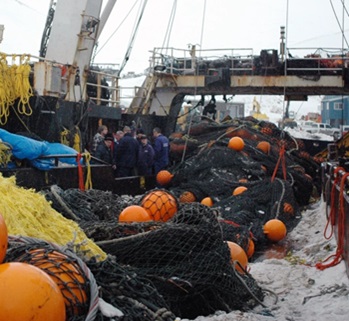 An advertiser-sponsored article in the Seattle Times gushed “Wild Alaska pollock’s fishing fleet is based right here in Seattle although all of the fish are caught in U.S. waters off of the coast of Alaska. This fishery benefits the economic growth of the entire region, including the North Pacific Fishing Fleet.” That includes 300 commercial fishing vessels of which 226 fish in Alaska. Many of the boats are huge catcher-processors — factory trawlers — that target pollock, cod, rockfish, flounders and other “groundfish” species. Alaska pollock alone is a 3 billion-pound fishery worth roughly $2 billion. And every year, the Seattle trawlers take home up to 76% of the value of ALL groundfish caught in the Bering Sea and Gulf of Alaska. It’s not a new scenario. Starting in 1885 and until Alaska became a state in 1959, Seattle companies used big traps to catch salmon throughout the territory. more, >>CLICK TO READ<< 10:55 By Laine Welch
An advertiser-sponsored article in the Seattle Times gushed “Wild Alaska pollock’s fishing fleet is based right here in Seattle although all of the fish are caught in U.S. waters off of the coast of Alaska. This fishery benefits the economic growth of the entire region, including the North Pacific Fishing Fleet.” That includes 300 commercial fishing vessels of which 226 fish in Alaska. Many of the boats are huge catcher-processors — factory trawlers — that target pollock, cod, rockfish, flounders and other “groundfish” species. Alaska pollock alone is a 3 billion-pound fishery worth roughly $2 billion. And every year, the Seattle trawlers take home up to 76% of the value of ALL groundfish caught in the Bering Sea and Gulf of Alaska. It’s not a new scenario. Starting in 1885 and until Alaska became a state in 1959, Seattle companies used big traps to catch salmon throughout the territory. more, >>CLICK TO READ<< 10:55 By Laine Welch
Notice of Proposed Rulemaking: Chapter 25.76 Lobster Minimum Size
 This proposed rule-making incorporates the minimum lobster size required by Addendum XXVII: Increasing Protection of the Gulf of Maine/Georges Bank Spawning Stock that was originally approved by the Atlantic States Marine Fisheries Commission (ASMFC) in May 2023. In October 2024 Addendum XXXI postponed the implementation of certain measures from Addendum XXVII to July 1, 2025. For compliance with the current Interstate Fisheries Management Plan, this regulation implements changing the minimum size of lobster from 3 ¼ inches to 3 5/16 inches, effective July 1, 2025. more, >>CLICK TO READ<< 09:43
This proposed rule-making incorporates the minimum lobster size required by Addendum XXVII: Increasing Protection of the Gulf of Maine/Georges Bank Spawning Stock that was originally approved by the Atlantic States Marine Fisheries Commission (ASMFC) in May 2023. In October 2024 Addendum XXXI postponed the implementation of certain measures from Addendum XXVII to July 1, 2025. For compliance with the current Interstate Fisheries Management Plan, this regulation implements changing the minimum size of lobster from 3 ¼ inches to 3 5/16 inches, effective July 1, 2025. more, >>CLICK TO READ<< 09:43
Tragedy avoided by ‘narrowest of margins’ after Irish trawler collided into oil tanker
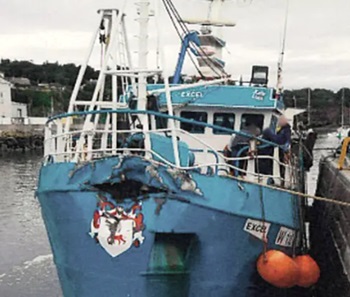 A tragedy was narrowly avoided last year when an Irish trawler ran into the side of a large oil tanker in the Irish Sea around 90km off the Waterford coast, according to an official investigation into the collision. A report by the Marine Casualty Investigation Board found that the standard of look-out on both vessels was “wholly inadequate” and the “root cause” of the incident. The MCIB said the collective failure of both vessels to keep a proper look-out had led to a loss of situational awareness which made a collision inevitable. more, >>CLICK TO READ<< 08:44
A tragedy was narrowly avoided last year when an Irish trawler ran into the side of a large oil tanker in the Irish Sea around 90km off the Waterford coast, according to an official investigation into the collision. A report by the Marine Casualty Investigation Board found that the standard of look-out on both vessels was “wholly inadequate” and the “root cause” of the incident. The MCIB said the collective failure of both vessels to keep a proper look-out had led to a loss of situational awareness which made a collision inevitable. more, >>CLICK TO READ<< 08:44
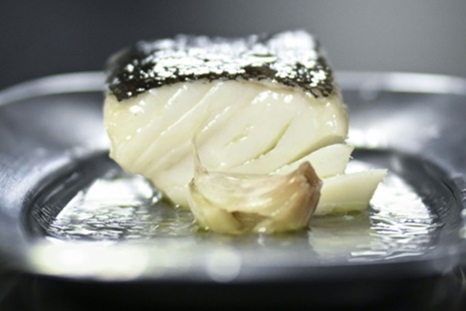
Cod is king in Portugal at Christmas
Salt cod has long been a national staple in Portugal, where it is said there are as many recipes for this humble fish as there are days in the year. And at Christmas the dried and salted fish is central to meals at family gatherings in Portugal, the world’s biggest consumer of “bacalhau” as it is called here, just as turkey is at Thanksgiving in the United States. The most traditional way to prepare salt cod is to bake it in the oven and serve it with boiled potatoes. But it can also be grilled, turned into fritters or even used to replace meat in a lasagna. When I’m asked to come up with a menu for Christmas, I am bound to suggest a salt cod recipe,” said chef Ricardo Simoes of the Federico restaurant located at a luxury hotel in central Lisbon. photos, more, >>CLICK TO READ<< 07:18
Ottawa has ‘carefully calculated plan’ to wreck eel business: lawsuit
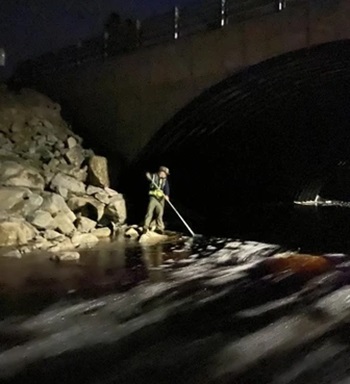 A New Brunswick entrepreneur whose family pioneered the baby eel industry in Canada is suing Ottawa again after it told her she would likely lose nearly 90 per cent of her business to First Nations and other people who want to get in on the lucrative fishery. In a filing in the Court of King’s Bench in Fredericton on Dec. 9, Mary Ann Holland accuses the defendants, who include three successive federal fisheries ministers and eight high-ranking officials in the Department of Fisheries and Oceans, or DFO, of having “engaged in a carefully calculated plan” over the years to drive her “out of business,” and give it away to First Nations and other fishers. “Such a plan represents patent gross abuse,” that they know will cause her companies, Brunswick Aquaculture and Alder Seafood, great damage, the lawsuit states. more, >>CLICK TO READ<< 14:56
A New Brunswick entrepreneur whose family pioneered the baby eel industry in Canada is suing Ottawa again after it told her she would likely lose nearly 90 per cent of her business to First Nations and other people who want to get in on the lucrative fishery. In a filing in the Court of King’s Bench in Fredericton on Dec. 9, Mary Ann Holland accuses the defendants, who include three successive federal fisheries ministers and eight high-ranking officials in the Department of Fisheries and Oceans, or DFO, of having “engaged in a carefully calculated plan” over the years to drive her “out of business,” and give it away to First Nations and other fishers. “Such a plan represents patent gross abuse,” that they know will cause her companies, Brunswick Aquaculture and Alder Seafood, great damage, the lawsuit states. more, >>CLICK TO READ<< 14:56
A new purse seiner from Galicia for Angola
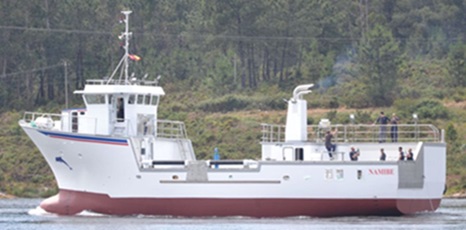 F/V Delta II is already in its home port of Namibe in Angola. It arrived there from Galicia – specifically from the small town of Catoira. This village of only 3300 inhabitants is home to Astilleros del Ulla, a small company focused on building vesels for export. The new purse seiner has a length of 23.95 metres in length and an 8-metre beam, designed to meet Angolan regulations which set limitations on the length and capacity of fishing vessels. Photos, information, more, >>CLICK TO READ<< 12:46
F/V Delta II is already in its home port of Namibe in Angola. It arrived there from Galicia – specifically from the small town of Catoira. This village of only 3300 inhabitants is home to Astilleros del Ulla, a small company focused on building vesels for export. The new purse seiner has a length of 23.95 metres in length and an 8-metre beam, designed to meet Angolan regulations which set limitations on the length and capacity of fishing vessels. Photos, information, more, >>CLICK TO READ<< 12:46
In the Pacific Northwest, killing sea lions is a necessity
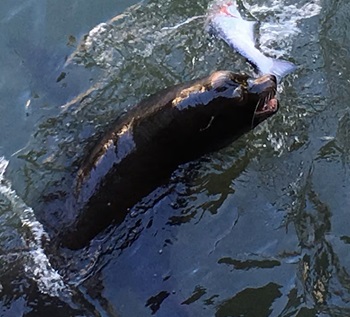 Don’t let their adorable faces and playful personalities fool you: California and Steller sea lions are capable of having disastrous impacts on nonnative ecosystems. In places like the Columbia River Gorge, these so-called dogs of the sea have been encroaching on native fish habitats for decades. Making homes in the Pacific, in coastal areas like the beaches of California, Alaska and Japan, these sea lions especially thrive on the West Coast, where population numbers are estimated to have grown from 75,000 to 257,000 in the last 30 years. This population boom has meant increased nutritional needs, sending thousands of sea lions inland in search of prey. One of the easiest targets for sea lions is the Columbia River, one of North America’s largest rivers and a key migration route for North American fish. The picturesque river valley abounds with seafood, including 13 federally protected species. more, >>CLICK TO READ<< 10:12
Don’t let their adorable faces and playful personalities fool you: California and Steller sea lions are capable of having disastrous impacts on nonnative ecosystems. In places like the Columbia River Gorge, these so-called dogs of the sea have been encroaching on native fish habitats for decades. Making homes in the Pacific, in coastal areas like the beaches of California, Alaska and Japan, these sea lions especially thrive on the West Coast, where population numbers are estimated to have grown from 75,000 to 257,000 in the last 30 years. This population boom has meant increased nutritional needs, sending thousands of sea lions inland in search of prey. One of the easiest targets for sea lions is the Columbia River, one of North America’s largest rivers and a key migration route for North American fish. The picturesque river valley abounds with seafood, including 13 federally protected species. more, >>CLICK TO READ<< 10:12
End to lobster war with China could save Australia’s fishermen
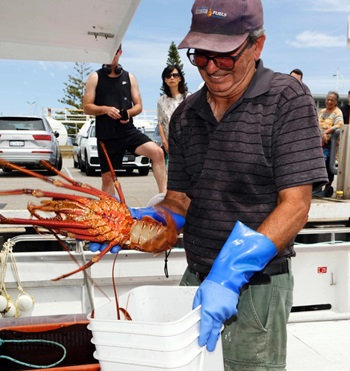 In this part of the world, the small, spiny, clawless western rock lobsters — commonly known in Australia as crayfish — play a starring role on seafood platters. “It’s our busiest time of the year,” said James Paratore, a fisherman who will be among those selling the lobsters from the back of his boat on Monday with his father Joe in Fremantle, near Perth. While trade in the local delicacy picks up over the festive period, the fishing industry has struggled since losing its biggest customer by far: China. Four years ago, exports to the lucrative Chinese market were sealed off by a trade war. Now they are in a cautiously celebratory mood after Beijing confirmed on Friday its trade ban on Australian rock lobsters had officially been lifted. Photos, more, >>CLICK TO READ<< 06:54
In this part of the world, the small, spiny, clawless western rock lobsters — commonly known in Australia as crayfish — play a starring role on seafood platters. “It’s our busiest time of the year,” said James Paratore, a fisherman who will be among those selling the lobsters from the back of his boat on Monday with his father Joe in Fremantle, near Perth. While trade in the local delicacy picks up over the festive period, the fishing industry has struggled since losing its biggest customer by far: China. Four years ago, exports to the lucrative Chinese market were sealed off by a trade war. Now they are in a cautiously celebratory mood after Beijing confirmed on Friday its trade ban on Australian rock lobsters had officially been lifted. Photos, more, >>CLICK TO READ<< 06:54
Farmer who became seafood champion takes on new roles in fishing industry
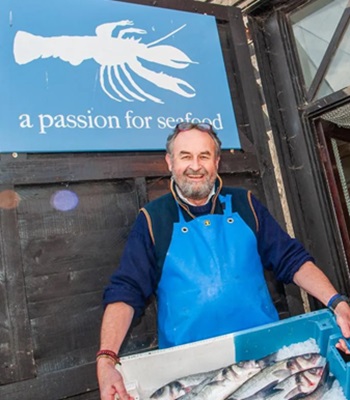 For complicated reasons, UK seafood has become marginalized in its home market. Despite a stunning coastline filled with a rich array of sea species, the UK exports much of its own fish produce to countries which appreciate it – only to import vast amounts of seafood for home consumption from abroad. It’s a conundrum which has vexed Mike Warner, founder of A Passion for Seafood, for many years. In the UK, we stick largely to what we know – cod, haddock, farmed salmon, tinned tuna and prawns – most of which is sourced from abroad. Meanwhile there are 40 to 50 commercial marine species which UK consumers largely ignore, and which instead make their way to high-class continental restaurants and to grateful seafood connoisseurs. “We have got a paradox in this country that we export 80% of what we catch and import 80% of what we consume,” he says. more, >>CLICK TO READ<< 13:09
For complicated reasons, UK seafood has become marginalized in its home market. Despite a stunning coastline filled with a rich array of sea species, the UK exports much of its own fish produce to countries which appreciate it – only to import vast amounts of seafood for home consumption from abroad. It’s a conundrum which has vexed Mike Warner, founder of A Passion for Seafood, for many years. In the UK, we stick largely to what we know – cod, haddock, farmed salmon, tinned tuna and prawns – most of which is sourced from abroad. Meanwhile there are 40 to 50 commercial marine species which UK consumers largely ignore, and which instead make their way to high-class continental restaurants and to grateful seafood connoisseurs. “We have got a paradox in this country that we export 80% of what we catch and import 80% of what we consume,” he says. more, >>CLICK TO READ<< 13:09
Trawlers applaud rejection of efforts to ban PWS trawling
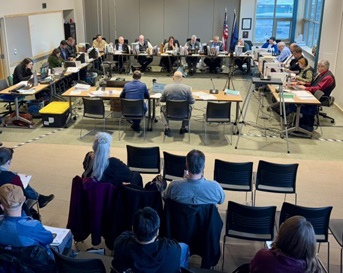 Members of the Alaska Pollock Fishery Alliance are applauding an Alaska Board of Fisheries decision made in Cordova in opposition to a proposed ban on trawling in Prince William Sound. In a statement issued on Dec. 16 from Cordova, the Alliance cited the board’s decision as a “collaborative victory for science-based fisheries management, sustainable fishing practices, and Alaska’s coastal communities.” “It was also a profound moment of solidarity for sustainable fisheries among stakeholders who sometimes compete for resources in these challenging economic times,” the Alliance said. more, >>CLICK TO READ<< 09:37
Members of the Alaska Pollock Fishery Alliance are applauding an Alaska Board of Fisheries decision made in Cordova in opposition to a proposed ban on trawling in Prince William Sound. In a statement issued on Dec. 16 from Cordova, the Alliance cited the board’s decision as a “collaborative victory for science-based fisheries management, sustainable fishing practices, and Alaska’s coastal communities.” “It was also a profound moment of solidarity for sustainable fisheries among stakeholders who sometimes compete for resources in these challenging economic times,” the Alliance said. more, >>CLICK TO READ<< 09:37
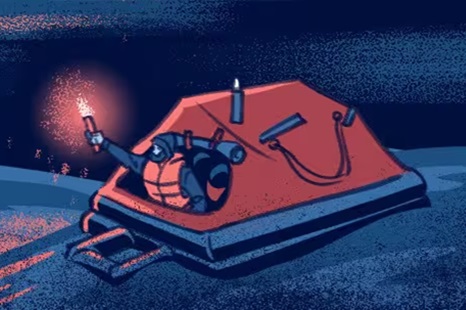
Lost at Sea
When a group of seven fishermen went missing off the northeast coast of Newfoundland in July, the small community of New-Wes-Valley was gripped with dread. Coast Guard captain Colin Roul describes the waters around Newfoundland and Labrador as dangerous and unforgiving. “Usually, when you hear distress situations like this, where no sign or sound was heard from these guys, yeah, the outcome is bleak,” he said. As 24 hours turned to 36, then 48, not much hope remained. “We knew this was going to be a regional funeral,” said Michael Tiller, mayor of New-Wes-Valley, where five of the seven men were from. “The food was ready. The place was booked. We were ready to help this town go through one of the worst disasters that it could ever go through. “But then, news of the nearly impossible — the men were found in a raft about 270 kilometres from shore. Photos, more, >>CLICK TO READ<< 07:43
F/V Elite Navigator, 10 posts, >>CLICK TO READ<<
California Dungeness crab opening date announced
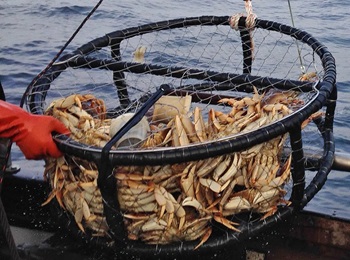 The California Department of Fish and Wildlife announced Friday it will open the commercial Dungeness crab fishery from the Sonoma/Mendocino County line to the U.S./Mexico border starting on Jan. 5. A pre-soak when crab pots can be baited in the water will begin at 8:01 a.m. Jan. 2 before the fishery opens at 12:01 a.m. on Jan. 5. This area (Fishing Zones 3, 4, 5 and 6) will be subject to a 50 percent trap reduction. The trap reduction is expected to reduce entanglement risk for humpback whales by decreasing the amount of gear and vertical lines in the water. The Dungeness crab season in the Northern Management Area (Zones 1 and 2, California/Oregon Border to the Sonoma/Mendocino County line) will be further delayed due to the inability to conduct industry-sponsored meat quality testing. more, >>CLICK TO READ<< 06:33
The California Department of Fish and Wildlife announced Friday it will open the commercial Dungeness crab fishery from the Sonoma/Mendocino County line to the U.S./Mexico border starting on Jan. 5. A pre-soak when crab pots can be baited in the water will begin at 8:01 a.m. Jan. 2 before the fishery opens at 12:01 a.m. on Jan. 5. This area (Fishing Zones 3, 4, 5 and 6) will be subject to a 50 percent trap reduction. The trap reduction is expected to reduce entanglement risk for humpback whales by decreasing the amount of gear and vertical lines in the water. The Dungeness crab season in the Northern Management Area (Zones 1 and 2, California/Oregon Border to the Sonoma/Mendocino County line) will be further delayed due to the inability to conduct industry-sponsored meat quality testing. more, >>CLICK TO READ<< 06:33
‘We Need Our Docks!’: Shrimpers’ plea as county reconsiders lease
 The Trico shrimp docks on San Carlos Island remain abandoned, damaged, and tangled in a growing dispute over their future. These docks once served as a vital unloading point for pink Gulf shrimp, supporting the livelihoods of hundreds of people in Fort Myers Beach. Now, the area’s shrimping industry faces an uncertain path forward. “Well, we don’t have any place to dock or unload right now,” said Dennis Henderson, President of Trico Shrimp Company, recalling a time when the docks bustled with activity. Without access to these docks, however, the entire industry could shrink drastically. Video, photos, more, >>CLICK TO READ<< 14:41
The Trico shrimp docks on San Carlos Island remain abandoned, damaged, and tangled in a growing dispute over their future. These docks once served as a vital unloading point for pink Gulf shrimp, supporting the livelihoods of hundreds of people in Fort Myers Beach. Now, the area’s shrimping industry faces an uncertain path forward. “Well, we don’t have any place to dock or unload right now,” said Dennis Henderson, President of Trico Shrimp Company, recalling a time when the docks bustled with activity. Without access to these docks, however, the entire industry could shrink drastically. Video, photos, more, >>CLICK TO READ<< 14:41
Nova Scotia against proposal to reallocate commercial elver quota
 “We just don’t agree,” Houston said about Ottawa’s proposal, which he called a shining example of the government’s “inability to properly understand and manage the fishery. It’s been communicated to them that we are not a fan of what they are trying to do there.” The elver fishery in the Maritimes has been tainted in recent years by drama and violence because of how profitable it is — the baby eels had reached market values as high as about $5,000 per kilogram in recent years. Under the proposed pilot allocation, the federal Fisheries Department is offering licences to 120 fishers currently employed by commercial licence holders, granting them 27 per cent of the overall quota. A further 1.5 per cent would be allocated to licences offered to 30 fishers who currently catch adult eels. more, >>CLICK TO READ<< 10:49
“We just don’t agree,” Houston said about Ottawa’s proposal, which he called a shining example of the government’s “inability to properly understand and manage the fishery. It’s been communicated to them that we are not a fan of what they are trying to do there.” The elver fishery in the Maritimes has been tainted in recent years by drama and violence because of how profitable it is — the baby eels had reached market values as high as about $5,000 per kilogram in recent years. Under the proposed pilot allocation, the federal Fisheries Department is offering licences to 120 fishers currently employed by commercial licence holders, granting them 27 per cent of the overall quota. A further 1.5 per cent would be allocated to licences offered to 30 fishers who currently catch adult eels. more, >>CLICK TO READ<< 10:49
Tension grows among Bay Area crab fishermen to find whale-safe alternative crabbing methods
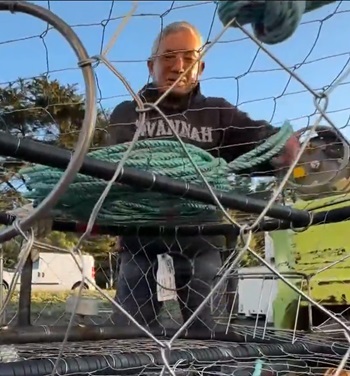 State regulators say the prevalence of marine life including humpback whales is too high for crab fishing to begin. Now there’s a growing tension among crab fishermen about alternative methods of whale-safe fishing to offset the losses of increasingly shortened seasons. Dick Ogg is a crab fisherman who also spends countless hours driving up and down the coast, advocating for others in the business without getting paid. Fishing is in the 72-year-old’s veins. Between calls with regulators and industry decision makers, Ogg prepares his own crab pots, employing just two deckhands who work in the side-yard of his home to save costs. But the Bodega Bay resident is concerned about a years-long push to promote high-tech “pop-up” fishing gear as the solution for whale-safe harvesting in the spring after the season ends. Video, more, >>CLICK TO READ<< 09:26
State regulators say the prevalence of marine life including humpback whales is too high for crab fishing to begin. Now there’s a growing tension among crab fishermen about alternative methods of whale-safe fishing to offset the losses of increasingly shortened seasons. Dick Ogg is a crab fisherman who also spends countless hours driving up and down the coast, advocating for others in the business without getting paid. Fishing is in the 72-year-old’s veins. Between calls with regulators and industry decision makers, Ogg prepares his own crab pots, employing just two deckhands who work in the side-yard of his home to save costs. But the Bodega Bay resident is concerned about a years-long push to promote high-tech “pop-up” fishing gear as the solution for whale-safe harvesting in the spring after the season ends. Video, more, >>CLICK TO READ<< 09:26
Fishing advocates alarmed at offshore wind development
 The Massachusetts Fishermen’s Partnership is urging lawmakers to reconsider the Gulf of Maine Offshore Wind Lease because of its effect on marine life, ecosystems and fishing communities. Bureau of Ocean Energy Management held a lease sale in the fall and selected nearly $22 million in winning bids from two businesses to develop wind power in four lease areas off the coast of New England. Gloucester’s Angela Sanfilippo, executive director of the Massachusetts Fishermen’s Partnership and president of the Gloucester Fishermen’s Wives Association, wants to sound the alarm not only among lawmakers but the public as well, questioning who really benefits from this move. “It is with a broken heart that I am sending this message,” she said. more, >>CLICK TO READ<< 07:49
The Massachusetts Fishermen’s Partnership is urging lawmakers to reconsider the Gulf of Maine Offshore Wind Lease because of its effect on marine life, ecosystems and fishing communities. Bureau of Ocean Energy Management held a lease sale in the fall and selected nearly $22 million in winning bids from two businesses to develop wind power in four lease areas off the coast of New England. Gloucester’s Angela Sanfilippo, executive director of the Massachusetts Fishermen’s Partnership and president of the Gloucester Fishermen’s Wives Association, wants to sound the alarm not only among lawmakers but the public as well, questioning who really benefits from this move. “It is with a broken heart that I am sending this message,” she said. more, >>CLICK TO READ<< 07:49
With right-wing backing, New England offshore wind opponents gain strength
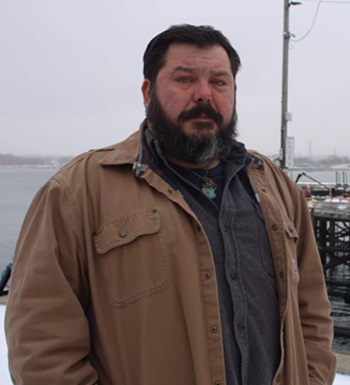 Jerry Leeman III is a fifth generation Maine fisherman and looks the part: broad shoulders, muscular hands, scraggly black beard with streaks of gray. Sitting at the head of an empty boardroom table in his South Portland office, he rails against the buildout of offshore wind currently getting underway in the Northeast. Leeman has read the government’s environmental assessments, and he’s heard scientific experts say turbines won’t destroy the marine ecosystem — but he doesn’t trust them. Plenty of fishermen in the Northeast feel they’re being squeezed out of existence by federal regulations and offshore wind development. But Leeman has a bigger platform than most. He founded and now leads the New England Fishermen’s Stewardship Association, better known as NEFSA. more, >>CLICK TO READ<< 06:18
Jerry Leeman III is a fifth generation Maine fisherman and looks the part: broad shoulders, muscular hands, scraggly black beard with streaks of gray. Sitting at the head of an empty boardroom table in his South Portland office, he rails against the buildout of offshore wind currently getting underway in the Northeast. Leeman has read the government’s environmental assessments, and he’s heard scientific experts say turbines won’t destroy the marine ecosystem — but he doesn’t trust them. Plenty of fishermen in the Northeast feel they’re being squeezed out of existence by federal regulations and offshore wind development. But Leeman has a bigger platform than most. He founded and now leads the New England Fishermen’s Stewardship Association, better known as NEFSA. more, >>CLICK TO READ<< 06:18
‘Tariffs not enough’ to save U.S. shrimping industry
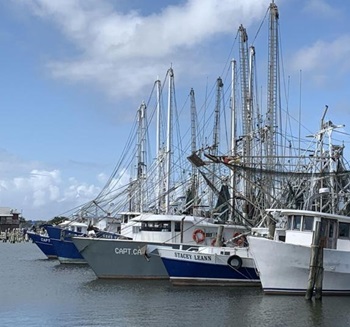 Alan Gibson, president of Tideland Seafood, summed up the frustration at a recent Louisiana Shrimp Task Force hearing in Houma. “Tariffs aren’t enough,” Gibson said. “The decrease in import prices is because of oversupply. They’re competing against each other to sell market share, and we’re fighting them, who are fighting each other.” Gibson called for a 25% import quota, saying it could reduce foreign competition enough to restore balance to the market. David Chauvin, a Louisiana-based seafood company owner, highlighted the disparity. Unlike tariffs, quotas directly limit the volume of imports, addressing the core issue of oversupply. By restricting imports, a quota could help stabilize domestic shrimp prices, allowing U.S. producers to compete more effectively. more, >>CLICK TO READ<< 16:58
Alan Gibson, president of Tideland Seafood, summed up the frustration at a recent Louisiana Shrimp Task Force hearing in Houma. “Tariffs aren’t enough,” Gibson said. “The decrease in import prices is because of oversupply. They’re competing against each other to sell market share, and we’re fighting them, who are fighting each other.” Gibson called for a 25% import quota, saying it could reduce foreign competition enough to restore balance to the market. David Chauvin, a Louisiana-based seafood company owner, highlighted the disparity. Unlike tariffs, quotas directly limit the volume of imports, addressing the core issue of oversupply. By restricting imports, a quota could help stabilize domestic shrimp prices, allowing U.S. producers to compete more effectively. more, >>CLICK TO READ<< 16:58
Pacific Seafood Completes Acquisition of Trident’s Kodiak Operations
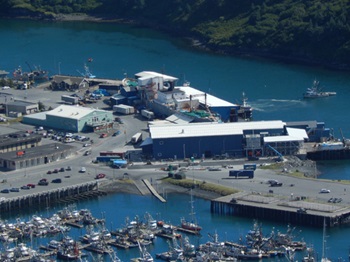 Pacific Seafood and Trident Seafoods today jointly announced the completion of Pacific’s acquisition of Trident’s Kodiak, Alaska, processing operations. The acquisition includes three well-established processing plants—Star of Kodiak, Alkod, and Kodiak Near Island—as well as the Plaza bunkhouse apartments for team member housing. Trident’s Kodiak team members will be retained by Pacific Seafood, ensuring continuity and stability for the team and the local community. “Kodiak is home to some of the most abundant and sustainable fisheries in the world, and we are honored to partner with our new, very talented team members, the fleet and the community to unlock new opportunities for this region,” more, >>CLICK TO READ<< 10:27
Pacific Seafood and Trident Seafoods today jointly announced the completion of Pacific’s acquisition of Trident’s Kodiak, Alaska, processing operations. The acquisition includes three well-established processing plants—Star of Kodiak, Alkod, and Kodiak Near Island—as well as the Plaza bunkhouse apartments for team member housing. Trident’s Kodiak team members will be retained by Pacific Seafood, ensuring continuity and stability for the team and the local community. “Kodiak is home to some of the most abundant and sustainable fisheries in the world, and we are honored to partner with our new, very talented team members, the fleet and the community to unlock new opportunities for this region,” more, >>CLICK TO READ<< 10:27
Mik’maq elver fishers hope quotas create safety on N.S. rivers, but critics doubtful
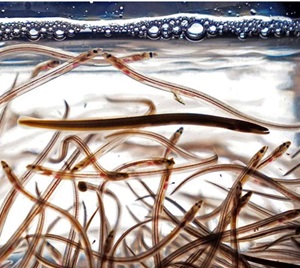 Indigenous elver fishers who once were at odds with federal fisheries officers say they’re hopeful that a new plan to provide them quotas this season will create more peace on the water. Earlier this month, a letter released by the federal Fisheries Department proposed a new quota system for the lucrative baby eel fishery that shifts 50 per cent of the total allowable catch of about 9,960 kilograms to First Nations fishers from commercial licence holders. Commercial elver fishers in the Maritimes have condemned the new system, saying it slashes their quotas without compensation, leaving little motivation for non-Indigenous companies to share their methods and facilities with the Indigenous entrants. more, >>CLICK TO READ<< 09:02
Indigenous elver fishers who once were at odds with federal fisheries officers say they’re hopeful that a new plan to provide them quotas this season will create more peace on the water. Earlier this month, a letter released by the federal Fisheries Department proposed a new quota system for the lucrative baby eel fishery that shifts 50 per cent of the total allowable catch of about 9,960 kilograms to First Nations fishers from commercial licence holders. Commercial elver fishers in the Maritimes have condemned the new system, saying it slashes their quotas without compensation, leaving little motivation for non-Indigenous companies to share their methods and facilities with the Indigenous entrants. more, >>CLICK TO READ<< 09:02







